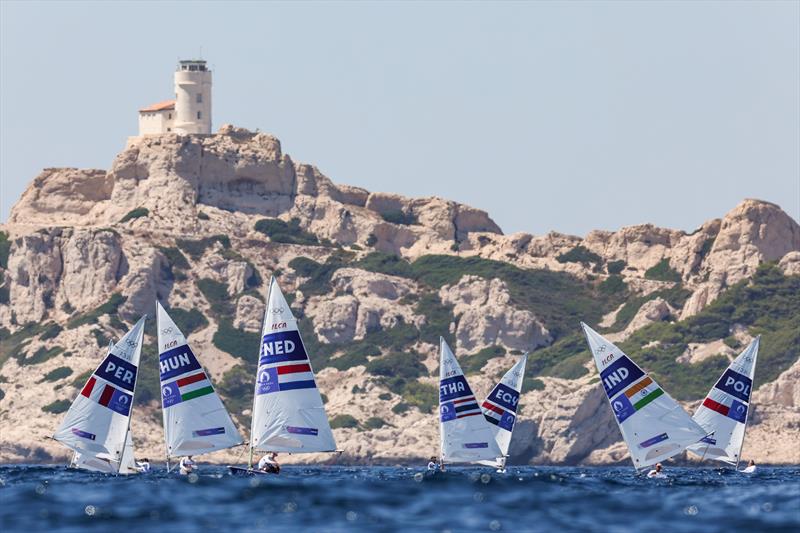
It's not normally like this
by Mark Jardine & Andi Robertson 5 Aug 00:47 HKT
4 August 2024

Downwind leg in the Men's Dinghy on August 4 in Marseille at the Paris 2024 Olympic Regatta © World Sailing / Sander van der Borch
How many times have we heard or said it? Knowing a sailing venue like the back of your hand, only for it to be completely different come the main event.
Take the Moth World Championships last year in Weymouth. Eight days in a row with next to no wind led to only two races being completed and the regatta declared null. Social media was true to form with someone commenting, "Why did they go to a known light wind venue?". Strange how keyboard warriors seem to know more than those who actually sail there...
The Men's Dinghy fleet in Marseille at the Paris 2024 Olympics is arguably one of the toughest to compete in, and watching the windward mark roundings leaves you chewing your fingernails.
The racing is tight, tense, tricky and treacherous. There seem to be more snakes than ladders, and the opportunities to trip up are plentiful.
Great Britain's Micky Beckett reinforced the 'It's not normally like this' sentiment. His Sunday didn't start well with a Black Flag in Race 7, but he climbed back up the fleet in Race 8 to end the day in fourth overall, just 5 points away from the medal places:
"We've spent a long time here and none of these conditions have really been what we have seen before. It was lighter today than expected. It is very disappointing to get the black flag. But the second race was a short race, as the breeze built after the course was set, and that made it something like a 35-minute race and that makes the turning marks a real, real mess - totally chaotic. I managed to catch up on the second beat and finish in the top ten.
"Overall, I've made some mistakes, but I am still in it, I am still in the game. You can't win these things until it's over and I am still in the game. I am happy with that. We have not really had many breezes like this at this time of the year before, there is a lot of uncertainty in the fleet about what is going to pay and what is not, and then you find out when it does."
Another sailor hit with a Black Flag was 2020 ILCA 7 World Champion Philipp Buhl, who has had a very mixed bag of results, and is struggling with the situation:
"The black flag was unfortunate, in that there was obviously a general recall, and I knew that at 10-15 seconds to go I was positioned quite far back a couple of lengths. After that I could see no transits and so it was down to guessing a little bit. And now reviewing the audio and a couple of screenshots from the pin end, I was well visible - it was marginal - it was half a second. On the tracker you can see. without exaggerating half the fleet was over, but only seven or eight were visible. We all know that you have to be covered at the start and then you can be over.
"The whole week is very disappointing now. It lifted my mood a little bit to win that second race, it lifted me out of a big deep hole. It is hard. It is the ILCA class. It is very, very tight. The conditions are a little bit different to that we had expected, a little bit more of the sea breeze. But we all expected some very tight racing with quite a lot of high scores. My hope is to get as high up as possible, maybe I can make it to the medal race and then I will still be disappointed... just not so disappointed."
With two races to go until the Medal Race, Buhl is only 7 points off the top ten, and with the way the scoring has been that's a far from insurmountable challenge.
Consistency is near impossible to find, but the cream still has a tendency of rising to the top, and thankfully, come the final day, the scoring format isn't the same as in the Windsurfing and Kiteboarding...
The wind may not normally be like this, but ILCA racing is always tight.
Full results so far can be found at paris2024.sailing.org/racing/results-centre